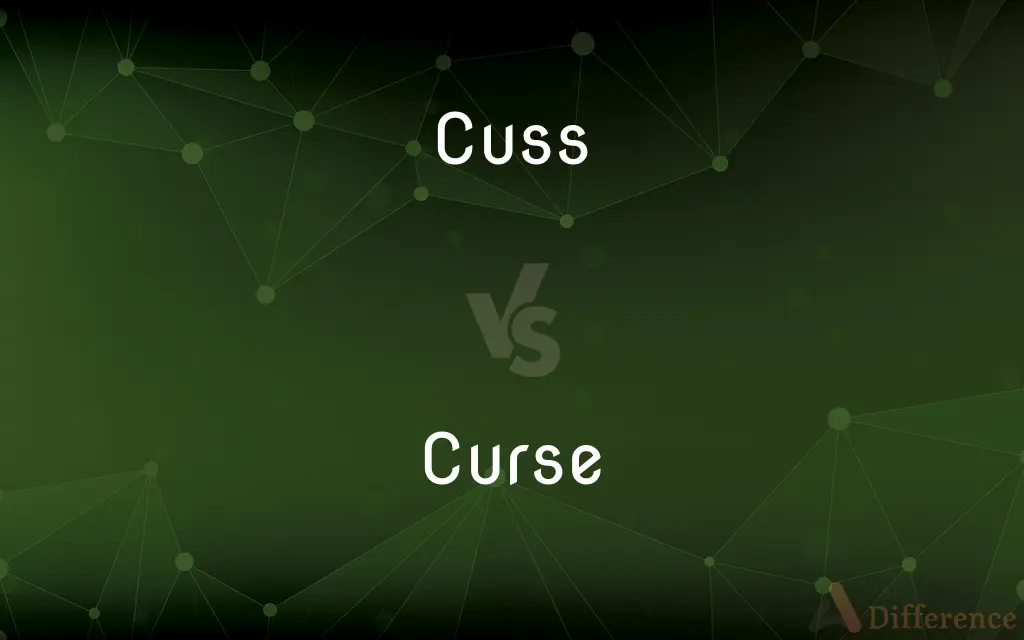Cuss vs. Curse — What's the Difference?
Edited by Tayyaba Rehman — By Urooj Arif — Updated on March 17, 2024
Cuss refers to informal, often vulgar language, used for expressing strong emotions, while curse implies a solemn utterance intended to invoke a supernatural power to inflict harm or punishment.

Difference Between Cuss and Curse
Table of Contents
ADVERTISEMENT
Key Differences
Cuss and curse, while often used interchangeably in colloquial language, have distinct connotations and uses. Cussing typically involves the use of swear words or profanities that are considered informal and vulgar. On the other hand, cursing carries a more serious tone and often has religious or supernatural undertones.
While both cussing and cursing can be used to express anger or dissatisfaction, the intention behind them differs. Cussing is more about immediate emotional expression and is often directed at inanimate objects or situations rather than individuals. Cursing, however, is typically directed at a person or entity with the intention of causing harm through supernatural means.
In modern usage, the distinction between cussing and cursing has blurred, especially in informal contexts where "curse" can simply mean to use foul language. However, in more traditional or formal contexts, the distinction remains relevant, with cursing retaining its association with supernatural or religious imprecations.
Despite these differences, both cussing and cursing are subject to social and cultural norms regarding appropriate language use. What is considered a cuss word in one culture may be benign in another, and the acceptability of cursing varies widely among different religions and belief systems.
Comparison Chart
Definition
Use of informal or vulgar language for emotion
Invocation of supernatural power for harm
ADVERTISEMENT
Context
Informal, everyday situations
Serious, often with religious or supernatural context
Intent
Express strong emotions, vent frustration
Inflict harm or punishment, wish bad luck
Target
Often inanimate objects or situations
Directed at individuals, entities
Cultural Perception
Generally less serious, varies by culture
Often considered more serious, varies by belief system
Compare with Definitions
Cuss
The act of using informal or vulgar language to express emotion.
After stubbing his toe, he couldn't help but let out a loud cuss.
Curse
A solemn utterance intended to invoke a supernatural power to inflict harm or punishment.
The witch's curse was feared by all in the village.
Cuss
A spontaneous reaction to pain or surprise.
A sharp cuss escaped her lips when she dropped the heavy book on her foot.
Curse
Carries significant cultural and historical weight in many societies.
The story of the family's curse has been passed down for generations.
Cuss
Acceptability varies by context; more acceptable in casual settings.
While a cuss might slip out in casual conversation, he made sure to watch his language at work.
Curse
Tied to religious or superstitious beliefs.
The ancient curse, according to legend, was placed by the gods themselves.
Cuss
Reflects informal speech patterns, often among friends.
They shared jokes and cusses over drinks, enjoying the relaxed atmosphere.
Curse
Often involves serious intentions or consequences.
Believers feared the curse would bring years of bad luck.
Cuss
What is considered a cuss word varies widely across cultures.
He was surprised to learn that what he thought was a harmless cuss was offensive in another culture.
Curse
Curses are usually directed at specific individuals or entities.
The curse was specifically aimed at those who wronged him.
Cuss
To curse or curse at.
Curse
A curse (also called an imprecation, malediction, hex, execration, malison, anathema, or commination) is any expressed wish that some form of adversity or misfortune will befall or attach to one or more persons, a place, or an object. In particular, "curse" may refer to such a wish or pronouncement made effective by a supernatural or spiritual power, such as a god or gods, a spirit, or a natural force, or else as a kind of spell by magic or witchcraft; in the latter sense, a curse can also be called a hex or a jinx.
Cuss
A curse.
Curse
An appeal or prayer for evil or misfortune to befall someone or something.
Cuss
A stubborn or annoying person or animal.
Curse
Evil or misfortune viewed as resulting from such an appeal
Believed that the amulet would ward off curses.
Cuss
To use cursing, to use bad language, to speak profanely.
Curse
A source or cause of evil; a scourge
“Selfishness is the greatest curse of the human race” (William Ewart Gladstone).
Cuss
A curse.
Curse
A profane word or phrase; a swearword.
Cuss
A curse word.
Curse
(Ecclesiastical) A censure, ban, or anathema.
Cuss
A fellow, person.
Curse
(Offensive) Menstruation. Used with the.
Cuss
A persistently annoying person
Curse
To invoke evil or misfortune upon; damn.
Cuss
A boy or man;
That chap is your host
There's a fellow at the door
He's a likable cuss
Curse
To swear at
Cursed the car because it wouldn't start.
Cuss
Profane or obscene expression usually of surprise or anger;
Expletives were deleted
Curse
To bring evil upon; afflict
Was cursed with crippling arthritis.
Cuss
Utter obscenities or profanities;
The drunken men were cursing loudly in the street
Curse
(Ecclesiastical) To put under a ban or anathema; excommunicate.
Curse
To utter curses; swear.
Curse
A supernatural detriment or hindrance; a bane.
Curse
A prayer or imprecation that harm may befall someone.
Curse
The cause of great harm, evil, or misfortune; that which brings evil or severe affliction; torment.
Curse
A vulgar epithet.
Curse
A woman's menses.
Curse
(transitive) To place a curse upon (a person or object).
Curse
To call upon divine or supernatural power to send injury upon; to imprecate evil upon; to execrate.
Curse
(transitive) To speak or shout a vulgar curse or epithet.
Curse
(intransitive) To use offensive or morally inappropriate language.
Curse
To bring great evil upon; to be the cause of serious harm or unhappiness to; to furnish with that which will be a cause of deep trouble; to afflict or injure grievously; to harass or torment.
Curse
To call upon divine or supernatural power to send injury upon; to imprecate evil upon; to execrate.
Thou shalt not . . . curse the ruler of thy people.
Ere sunset I'll make thee curse the deed.
Curse
To bring great evil upon; to be the cause of serious harm or unhappiness to; to furnish with that which will be a cause of deep trouble; to afflict or injure grievously; to harass or torment.
On impious realms and barbarous kings imposeThy plagues, and curse 'em with such sons as those.
Curse
To utter imprecations or curses; to affirm or deny with imprecations; to swear.
Then began he to curse and to swear.
His spirits hear me,And yet I need must curse.
Curse
An invocation of, or prayer for, harm or injury; malediction.
Lady, you know no rules of charity,Which renders good for bad, blessings for curses.
Curse
Evil pronounced or invoked upon another, solemnly, or in passion; subjection to, or sentence of, divine condemnation.
The priest shall write these curses in a book.
Curses, like chickens, come home to roost.
Curse
The cause of great harm, evil, or misfortune; that which brings evil or severe affliction; torment.
The common curse of mankind, folly and ignorance.
All that I eat, or drink, or shall beget,Is propagated curse.
Curse
Profane or obscene expression usually of surprise or anger;
Expletives were deleted
Curse
An appeal to some supernatural power to inflict evil on someone or some group
Curse
An evil spell;
A witch put a curse on his whole family
He put the whammy on me
Curse
Something causes misery or death;
The bane of my life
Curse
A severe affliction
Curse
Utter obscenities or profanities;
The drunken men were cursing loudly in the street
Curse
Heap obscenities upon;
The taxi driver who felt he didn't get a high enough tip cursed the passenger
Curse
Wish harm upon; invoke evil upon;
The bad witch cursed the child
Curse
Exclude from a church or a religious community;
The gay priest was excommunicated when he married his partner
Common Curiosities
Can "curse" mean to use bad language?
Yes, in informal contexts, "curse" can also mean using foul or offensive language, similar to "cuss."
Are curses real?
Belief in the power of curses varies by culture, religion, and personal beliefs; scientifically, there's no evidence to support their efficacy.
Is cussing always offensive?
Whether cussing is offensive varies by cultural norms, context, and the audience's sensibilities.
What is a curse?
A curse is a solemn wish or invocation for harm, misfortune, or punishment to befall someone, often invoking supernatural powers.
What is cussing?
Cussing is the act of using informal or vulgar language, typically to express strong emotions.
Is it illegal to cuss in public?
In some jurisdictions, there are laws against public profanity, though enforcement and specifics vary widely.
What makes a word a cuss word?
A word becomes a cuss word primarily through societal consensus that it is vulgar or offensive.
Can a curse be lifted?
In cultures and belief systems that accept the reality of curses, there are often rituals or actions believed to lift or break them.
Do curses have to be spoken?
While many curses are spoken, some traditions believe in written or even thought curses having power.
Why do people cuss?
People cuss for various reasons, including expressing pain, frustration, surprise, or other strong emotions.
How do social norms affect cussing?
Social norms dictate the acceptability of cussing in different contexts, influencing where and how it's used.
Can the context change the meaning of a curse?
Yes, context can greatly influence the perceived seriousness and intent of a curse, especially between different cultures or belief systems.
Can anyone cast a curse?
Beliefs vary; some traditions hold that only certain individuals, like witches or shamans, can effectively cast curses.
What role does intention play in cussing vs. cursing?
Intention plays a significant role; cussing is often impulsive and emotional, whereas cursing is deliberate and aimed at causing harm.
How do cultural perceptions of cursing differ?
Perceptions of cursing vary greatly, with some cultures viewing it as a severe act and others as a more casual form of speech.
Share Your Discovery

Previous Comparison
Discount vs. Saving
Next Comparison
Astronaut vs. CosmonautAuthor Spotlight
Written by
Urooj ArifUrooj is a skilled content writer at Ask Difference, known for her exceptional ability to simplify complex topics into engaging and informative content. With a passion for research and a flair for clear, concise writing, she consistently delivers articles that resonate with our diverse audience.
Edited by
Tayyaba RehmanTayyaba Rehman is a distinguished writer, currently serving as a primary contributor to askdifference.com. As a researcher in semantics and etymology, Tayyaba's passion for the complexity of languages and their distinctions has found a perfect home on the platform. Tayyaba delves into the intricacies of language, distinguishing between commonly confused words and phrases, thereby providing clarity for readers worldwide.













































